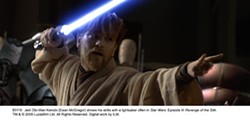Hollywood gets zapped
Who's to blame for low sales at theaters and DVD stores – Tinseltown liberals or lazy fans? Could it be that most movies are just bad?
How to explain the stench of impending doom emanating from Hollywood? It's not the release of The Dukes of Hazzard. It's Tinseltown's bad B.O. and Shrek-ugly DVD sales. Recent ticket sales might have finally broken a 19-week slump every bit as uncomfortable as the phallic antenna display at the heart of the all-too-aptly named Herbie: Fully Loaded, but nobody's breaking out the bubbly in La La Land just yet. In fact, the movers and shakers out there are showing more flop sweat than Jerry Lewis at a viewing of The Day the Clown Cried.
Theater admissions for 2005 are down about 10.4 percent from a year ago. Summer admissions are down 14 percent from last year. DVD sales, which account for more than 60 percent of studio revenues these days, similarly seem to be hitting the skids. While DVD unit shipments were up 21 percent for the first quarter of 2005, that's less than half the increase over the same period in 2004 and the smallest year-over-year quarterly growth rate since DVDs became available.
As one Forrester Research analyst understated to the Chicago Tribune, "This is sort of scary to the movie industry right now."
So what's going on? The two leading explanations for sagging sales are not only as cliched as Jerry Bruckheimer's mega-productions, they're mutually exclusive to boot. One side blames the messenger, saying that bin Laden-loving, Bush-bashing studio heads are pointedly alienating the public that pays them so well. Producers declare that fault lies not with our stars and the often awful movies they make, but with non-moviegoing swine who can't appreciate the edutainment pearls beneficently cast before them. Just like when Rocky met Drago, Abbott and Costello met Frankenstein and Harry met Sally, there's really no one to root for in this clash of civilizations.
"The most obvious explanation for box office malaise is consistently overlooked," writes Govindini Murty, a columnist for Newsmax, co-director of the Liberty Film festival and contributor to the conservative film blog Libertas, on the op-ed page of the Los Angeles Times. "Hollywood's ruling liberal elites keep going out of their way to offend half their audience."
In Murty's telling, Ridley Scott's crusader epic Kingdom of Heaven bombed because it posited moral equivalency between Christian fighters of old and "Islamo-fascists" of today, not because Orlando Bloom is a weak-kneed, dewy-eyed lead actor better suited to playing a sharpshooting elf than a compelling sword-and-sandal he-man. Murty allows that the final Star Wars flick, Revenge of the Sith, was "an artistic success" but notes director George Lucas' cryptic utterances that the movie was an attack on Bushitler's Iraq policy, kept her -- and ostensibly others -- from "repeated viewings."
"Hollywood could turn things around," Murti asserts, "but that might mean tolerating films with pro-conservative themes."
The holes in this plot are worthy of an Ed Wood joint. For starters, consider that the artistically successful but unpatriotic Revenge of the Sith, released only in late May, has already pulled in more than $370 million in the US; that's enough to make it the ninth highest-grossing release of all time and third-biggest of the six Star Wars films, with only A New Hope and The Phantom Menace topping it (albeit in non-inflation-adjusted dollars). It's still pulling in more than $2 million a week, so who knows what its final take will be. If that's offending half the audience for a film whose every plot point was telegraphed years ago, it's still doing pretty well. And what about that pro-little-guy, pro-family-man, anti-bad-guy fable Cinderella Man, which is precisely the sort of stand-up-and-cheer cinematic fare that Murty herself applauds and a host of conservative commentators hoped would draw in the patriotic masses?
By every account, Cinderella Man is box office poison. Its Depression-era hero, the journeyman pug Jimmy Braddock, may have brought America to its feet when the country was on its knees (to paraphrase the film's cloying, nausea-inducing tag line). But as it turns out, few of us were willing to get off our asses to watch Paul Hogan epigone Russell Crowe punch someone in a movie when we could watch him apologize for hurling hotel room phones right there in our living rooms.
Turning to DVDs, what happened to The Incredibles, a pro-family, anti-egalitarian, anti-p.c., Ayn Rand-ish movie that was a smashing success at the box office and has so far stiffed at the checkout counter? Indeed, Pixar, the animation giant responsible for The Incredibles, had to trim its profit forecasts due to the slow sales of that title. If the message matters so much, shouldn't that DVD be moving quicker than the speedy Dash did on water?
The other cartoon-movie behemoth, DreamWorks Animation, also had to lower earnings expectations -- and scrap a planned stock offering -- because DVD sales of its box office hit Shrek 2 went poof like so much Fairy Godmother dust. Shrek 2 is another pro-family, conservative-friendly film (in that it makes no tendentious political points about contemporary America) that shouldn't be having such problems, according to Murty's analysis.
For their part, semi-delusional industry insiders wave off Hollywood dissenters such as Murty, choosing instead to insist that the real problem is with stupid audiences. At least, that's the take of the folks behind Murderball, the well-reviewed new documentary about wheelchair rugby. When the film did half the business ThinkFilm expected, the company's suits knew audience dementia when they saw it.
"It's highly original, it's highly acclaimed, and it didn't take off," ThinkFilm head Jeff Sackman told the sympathetic LA Times.
"We're refusing to believe [Murderball] is dead because it's too good," he said, an unequivocal statement that suggested he did indeed believe Murderball was too good for its audience. The LA Times, in keeping with its reflexive boosterism and hometown pride in the local industry, picked up the cue and was quick to blame moviegoers' low I.Q. for the "soft box office" of "Disney's thriller Dark Water [which] similarly sought to provide a higher-brow alternative to mindless popcorn titles."
"We tried to make a legitimate picture, not a genre picture, and not take the easy way out," said Dark Water producer Bill Mechanic, who suggested the movie may have been better suited for a fall release. "There's no question, it's frustrating."
When Hollywood producers -- at Disney, no less! -- complain that their films are too sophisticated for viewers, well, maybe the terrorists have won. However frustrating Dark Water's weak performance may be to its producer, the movie itself seemed even more annoying to the folks who paid to watch it. The blame-the-masses explanation for slack box office is not only self-serving, it's woefully, even hilariously, incomplete. Maybe the widely noted tedium of Dark Water -- or the dangling plot threads, or whatever -- had something to do with the film's performance (they clearly had something to do with its generally bad reviews). And, as even the LA Times notes, fewer titles have been released in 2005 than the previous year, which doubtless has some role in the reduced box office totals.
The deeper issues are surely larger than the real or imagined quality of any film. And contrary to those who blame declining Hollywood receipts on liberal studio sachems or idiot audiences, the relevant trend-lines go back a lot further than the past few years. As the self-styled "Hollywood economist" Edward Jay Epstein has written, only about 10 percent of the US population goes to movies on a weekly basis these days. That's down from 65 percent half a century ago. As important, the share of studio receipts coming from theater box offices has declined from 100 percent in 1948 to a mere 18 percent in 2003. It's been replaced over the years by what Epstein dubs "the rise of the home entertainment economy," which consists of VHS and DVD rentals and sales, and pay and free TV fees. He also points out that this has not been a disaster for the six major studios -- Paramount, Warner Bros., 20th Century Fox, Disney, Universal and Sony -- which are in fact doing as well as or better than ever. The recent drop-offs have hurt the smaller players.
Epstein explains flat or declining ticket sales well, but he doesn't quite get at the DVD issue (more on that in a moment). I think he's right that we are shifting to something like a home entertainment economy, although that term is far too confining to adequately describe what I've defined elsewhere as "the culture boom," the vast increase in the production and consumption of art, music, print, video and other forms of creative expression that characterize contemporary America.
Government figures on media usage of people 18 years and older estimate that the typical American consumed 3,444 hours of books, music, video, Internet and the like in 1999. That figure was 3,599 hours in 2002 and is projected to rise to 3,874 hours by 2007. Simply put, we've got far more options than we used to. Central to this experience is our ability to control where and when we consume popular culture. We take for granted each baby step or leap forward in personalized popular culture -- who really gets misty-eyed discussing the Walkman, factory-installed DVD players in cars, or even the Internet anymore? -- but such technological shifts have fundamentally altered our day-to-day life as much as anything else.
So about DVD sales: It's important to underscore that they are still increasing, even if it's at a decreasing rate. Part of this is to be expected. As a mass phenomenon, DVDs may be less than a decade old, but there comes a time when every new technology starts to flatten out. If this is happening to DVDs, it's partly because of the speed with which the medium was adopted. And the speed with which alternatives are cropping up. As the Chicago Tribune puts it, video on demand -- widely and rightly viewed as a "direct substitution" for buying or renting DVDs -- is coming on like gangbusters. In 2004, 19 million people could get video on demand, up 50 percent from 2003. The Trib also notes that DVDs are increasingly marketed the same way that movies are often distributed. That is, traditional vendors expect and demand a big opening weekend. Ideally, vendors want to stock fewer titles that sell well rather than many titles that sell few. If a title opens slow, it will probably get returned to its maker quickly.
This hardly constitutes a crisis, even if it does make the local Blockbuster or Wal-Mart less interesting than it might otherwise be. But as that sort of mentality may be gaining ground in traditional bricks-and-mortar retailers, it's being more than offset by the effectively limitless shelf-space model offered by Amazon, Netflix, Rhapsody and other services. As Wired magazine's Chris Anderson detailed in his article on "The Long Tail," the real action is offering everything for sale. Even booksellers such as Barnes & Noble, which redefined the bookstore by vastly increasing the number of titles carried in a given "superstore," carry only a slim portion of what's actually in print.
"The average Barnes & Noble carries 130,000 titles. Yet more than half of Amazon's book sales come from outside its top 130,000 titles," Anderson writes. "Consider the implication: If the Amazon statistics are any guide, the market for books that are not even sold in the average bookstore is larger than the market for those that are... In other words, the potential book market may be twice as big as it appears to be, if only we can get over the economics of scarcity. Venture capitalist and former music industry consultant Kevin Laws puts it this way: 'The biggest money is in the smallest sales.'"
In a recent post on Anderson's constantly updated "The Long Tail" blog, he uses a comparison between Wal-Mart and the online music service Rhapsody to drive home his point with updated data. It may take a while, but it seems almost a lock that more and more retailers will embrace the long-tail mentality.
So as the always fabulously self-involved Hollywood worries about ticket slumps and slowing DVD sales, those of us who actually enjoy movies -- and music, and literature, and art -- can relax and enjoy more of what we want when we want it. And we can spend a little time musing on why Russell Crowe is so angry. Here's one possible reason: He may be fabulously well-paid and world famous, but he is a movie star at a time when stars, and content producers in general, have less and less power over their audience.
Nick Gillespie is the editor of Reason Magazine.
Latest in Cover
Calendar
-

Queen Charlotte Fair @ Route 29 Pavilion
-

NEW WINDOW GALLERY-Pat Rhea-ACRYLIC PAINTINGS-April 05-30 2024 VALDESE, NC 28690 @ New Window Gallery/Play It Again Records
- Through April 30, 12 p.m.
-

TheDiscountCodes
-

"Blood Residue Analysis of Paleoamerican Stone Tools in the Carolinas" @ Native American Studies Center
- Fri., April 26, 12-1 p.m.
-

Brightfire Music and Arts Festival @ GreenLife Family Farms
-
Charlotte Pride and Trans and Queer People of Color Collective clash on Pride Week priorities 2
Disagreements over representation, policing in lead-up to Pride
-
Upgrade Labs Announces Expansion Plans in Charlotte Continuing Its Tremendous Growth
-
Restaurants struggle as restrictions remain and temperatures decline 15
North Carolina restaurants that pivoted to outdoor seating are finding new challenges as winter approaches.










